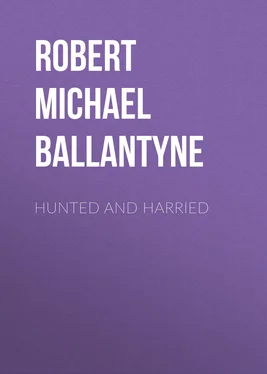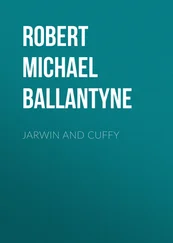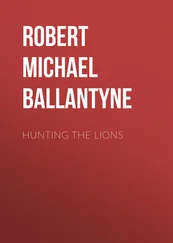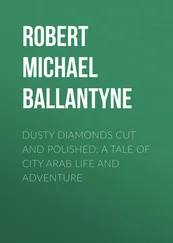Robert Michael Ballantyne - Hunted and Harried
Здесь есть возможность читать онлайн «Robert Michael Ballantyne - Hunted and Harried» — ознакомительный отрывок электронной книги совершенно бесплатно, а после прочтения отрывка купить полную версию. В некоторых случаях можно слушать аудио, скачать через торрент в формате fb2 и присутствует краткое содержание. Жанр: foreign_children, literature_19, foreign_antique, foreign_prose, на английском языке. Описание произведения, (предисловие) а так же отзывы посетителей доступны на портале библиотеки ЛибКат.
- Название:Hunted and Harried
- Автор:
- Жанр:
- Год:неизвестен
- ISBN:нет данных
- Рейтинг книги:5 / 5. Голосов: 1
-
Избранное:Добавить в избранное
- Отзывы:
-
Ваша оценка:
- 100
- 1
- 2
- 3
- 4
- 5
Hunted and Harried: краткое содержание, описание и аннотация
Предлагаем к чтению аннотацию, описание, краткое содержание или предисловие (зависит от того, что написал сам автор книги «Hunted and Harried»). Если вы не нашли необходимую информацию о книге — напишите в комментариях, мы постараемся отыскать её.
Hunted and Harried — читать онлайн ознакомительный отрывок
Ниже представлен текст книги, разбитый по страницам. Система сохранения места последней прочитанной страницы, позволяет с удобством читать онлайн бесплатно книгу «Hunted and Harried», без необходимости каждый раз заново искать на чём Вы остановились. Поставьте закладку, и сможете в любой момент перейти на страницу, на которой закончили чтение.
Интервал:
Закладка:
R. M. Ballantyne
Hunted and Harried
Chapter One.
On the Hunt
On a brilliant summer morning in the last quarter of the seventeenth century a small troop of horsemen crossed the ford of the river Cairn, in Dumfriesshire, not far from the spot where stands the little church of Irongray, and, gaining the road on the western bank of the stream, wended their way towards the moors and uplands which lie in the neighbourhood of Skeoch Hill.
The dragoons, for such they were, trotted rapidly along the road that led into the solitudes of the hills, with all the careless dash of men whose interests are centred chiefly on the excitements of the passing hour, yet with the unflagging perseverance of those who have a fixed purpose in view—their somewhat worn aspect and the mud with which they were bespattered, from jack-boot to iron headpiece, telling of a long ride over rugged ground.
The officer in command of the party rode a little in advance. Close behind him followed two troopers, one of whom was a burly middle-aged man with a stern, swarthy countenance; the other a youth whose tall frame was scarcely, if at all, less powerful than that of his comrade-in-arms, though much more elegant in form, while his youthful and ruddy, yet masculine, countenance suggested that he must at that time have been but a novice in the art of war.
This youth alone, of all the party, had a somewhat careworn and sad expression on his brow. It could hardly have been the result of fatigue, for there was more of ease and vigour in his carriage than in that of any of his companions.
“We should be near the river by this time, Glendinning,” said the leader of the party, reining in and addressing the swarthy trooper.
“Ay, sir, the Cluden rins jist ayont the turn o’ the road there,” replied the man. “Ye’ll hear the roar o’ the fa’ in a meenit or twa.”
Even as he spoke the dull growl of a cataract was heard, and, a few minutes later, the party came upon the ford of the river.
It was situated not many yards below the picturesque waterfall, which is now spanned by the Routen Bridge, but which, at that time, was unbridged—at all events, if a bridge had previously existed, it had fallen in or been carried away—and the wild gorge was impassable.
The sound of the fall alone told of its vicinity, for a dense mass of foliage hid it completely from the troopers’ view until they had surmounted the steep bank on the other side of the stream.
“Are you well acquainted with this man Black?” asked the leader of the party as they emerged from the thick belt of trees and shrubs by which the Cluden was shaded, and continued their journey on the more open ground beyond.
“I ken him weel, sir,” answered the trooper. “Andrew Black was an auld freend o’ mine, an’ a big, stoot, angry man he is—kindly disposed, nae doot, when ye let him alane, but a perfe’t deevil incarnate when he’s roosed. He did me an ill turn ance that I’ve no paid him off for yet .”
“I suppose, then,” said the officer, “that your guiding us so willingly to his cottage is in part payment of this unsettled debt?”
“Maybe it is,” replied the trooper grimly.
“They say,” continued the other, “that there is some mystery about the man; that somehow nobody can catch him. Like an eel he has slipped through our fellows’ fingers and disappeared more than once, when they thought they had him quite safe. It is said that on one occasion he managed even to give the slip to Claverhouse himself, which, you know, is not easy.”
“That may be, sir, but he’ll no slip through my fingers gin I ance git a grup o’ his thrapple,” said the swarthy man, with a revengeful look.
“We must get a grip of him somehow,” returned the officer, “for it is said that he is a sly helper of the rebels—though it is as difficult to convict as to catch him; and as this gathering, of which our spies have brought information, is to be in the neighbourhood of his house, he is sure to be mixed up with it.”
“Nae doot o’ that, sir, an’ so we may manage to kill twa birds wi’ ae stane. But I’m in a diffeeculty noo, sir, for ye ken I’m no acquaint wi’ this country nae farer than the Cluden ford, an’ here we hae come to a fork i’ the road.”
The party halted as he spoke, while the perplexed guide stroked his rather long nose and looked seriously at the two roads, or bridle-paths, into which their road had resolved itself, and each of which led into very divergent parts of the heathclad hills.
This guide, Glendinning, had become acquainted with Black at a time when the latter resided in Lanarkshire, and, as he had just said, was unacquainted with the region through which they now travelled beyond the river Cluden. After a short conference the officer in command decided to divide the party and explore both paths.
“You will take one man, Glendinning, and proceed along the path to the right,” he said; “I will try the left. If you discover anything like a house or cot within a mile or two you will at once send your comrade back to let me know, while you take up your quarters in the cottage and await my coming. Choose whom you will for your companion.”
“I choose Will Wallace, then,” said Glendinning, with a nod to the young trooper whom we have already introduced.
The youth did not seem at all flattered by the selection, but of course obeyed orders with military promptitude, and followed his comrade for some time in silence, though with a clouded brow.
“It seems to me,” said the swarthy trooper, as they drew rein and proceeded up a steep ascent at a walk, “that ye’re no’ sae pleased as ye might be wi’ the wark we hae on hand.”
“Pleased!” exclaimed the youth, whose tone and speech seemed to indicate him an Englishman, “how can I be pleased when all I have been called on to do since I enlisted has been to aid and abet in robbery, cruelty, and murder? I honour loyalty and detest rebellion as much as any man in the troop, but if I had known what I now know I would never have joined you.”
Glendinning gazed at his companion in amazement. Having been absent on detached service when Will Wallace had joined—about three weeks previously—he was ignorant both as to his character and his recent experiences. He had chosen him on the present occasion simply on account of his youth and magnificent physique.
“I doot I’ve made a mistake in choosin’ you ,” said Glendinning with some asperity, after a few moments, “but it’s ower late noo to rectifee’t. What ails ye, lad? What hae ye seen?”
“I have seen what I did not believe possible,” answered the other with suppressed feeling. “I have seen a little boy tortured with the thumbscrews, pricked with bayonets, and otherwise inhumanly treated because he would not, or could not, tell where his father was. I have seen a man hung up to a beam by his thumbs because he would not give up money which perhaps he did not possess. I have seen a woman tortured by having lighted matches put between her fingers because she would not, or could not, tell where a conventicle was being held. I did not, indeed, see the last deed actually done, else would I have cut down the coward who did it. The poor thing had fainted and the torture was over when I came upon them. Only two days ago I was ordered out with a party who pillaged the house of a farmer because he refused to take an oath of allegiance, which seems to have been purposely so worded as to make those who take it virtually bondslaves to the King, and which makes him master of the lives, properties, and consciences of his subjects—and all this done in the King’s name and by the King’s troops!”
“An’ what pairt did you tak’ in these doin’s?” asked Glendinning with some curiosity.
Читать дальшеИнтервал:
Закладка:
Похожие книги на «Hunted and Harried»
Представляем Вашему вниманию похожие книги на «Hunted and Harried» списком для выбора. Мы отобрали схожую по названию и смыслу литературу в надежде предоставить читателям больше вариантов отыскать новые, интересные, ещё непрочитанные произведения.
Обсуждение, отзывы о книге «Hunted and Harried» и просто собственные мнения читателей. Оставьте ваши комментарии, напишите, что Вы думаете о произведении, его смысле или главных героях. Укажите что конкретно понравилось, а что нет, и почему Вы так считаете.












